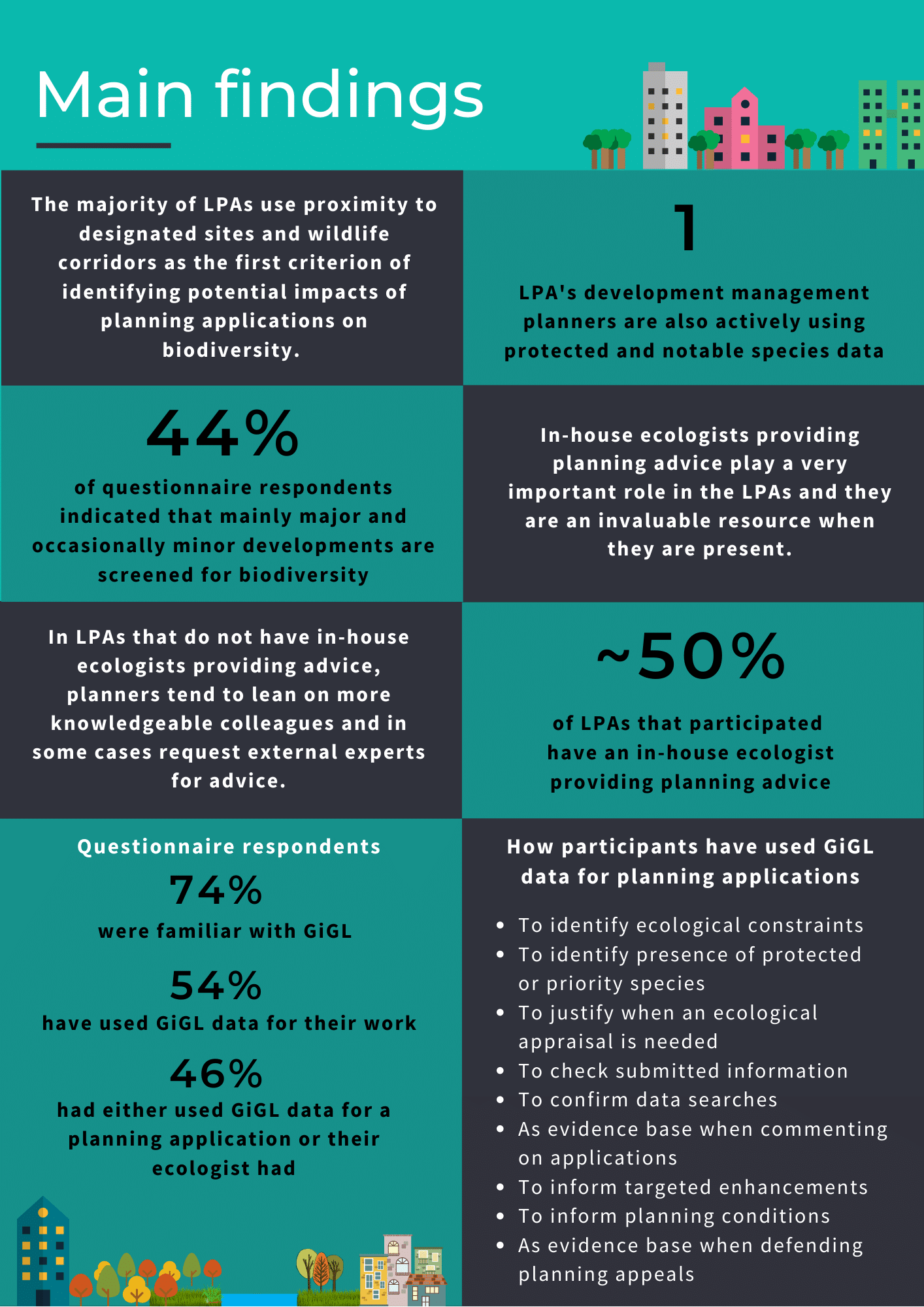Eleni Foui, GiGL Planning Research Officer
A whole year has passed since the “Biodiversity Evidence – Better Outcomes from Planning” project began. The project aims to support London’s Local Planning Authorities (LPAs) to achieve better outcomes for biodiversity through the planning process. We started by finding out how biodiversity is currently being taken into account and about the challenges faced. The information collected then informed the production of resources and training for use by LPA planners as guidance when looking into biodiversity matters of development projects.
We are grateful to everyone who responded to our call to participate in the first phase of the project. Representatives from 23 London LPAs shared their views and experiences with us. This included inner and outer London authorities, those with and without in-house ecologists, and both GiGL partner and non-partner organisations. We were also fortunate to receive responses from staff with many different roles within the LPAs. In total there were 39 responses to our questionnaire survey and 31 participants in meetings. Some of the interim results can be found on the project’s webpage and we will be publishing the final project report soon.

Based on the results of the first phase we’ve started producing tailored resources. The first two of these include an overview of policies and legislation, and a compilation of external resources; both focused on the needs of London’s LPAs. During the next few months, we will be looking to produce more resources (we have many more ideas) but also make the existing materials available in more interactive formats.
Although the current pandemic did not allow us to have our planned training events in person, we were able to organise some online training which took place on 23rd September 2020. The overall aim of this London focused event was to raise awareness about why planners need to take biodiversity into account, how they can do so and what are the common pitfalls in relation to biodiversity in planning.
Highlighting the appetite for this kind of training, the event was very popular and over fifty LPA staff registered from 24 LPAs. We were privileged to have a great team of external presenters, all with many years of experience working on biodiversity matters in London. Sessions were delivered and supported by London LPA in-house ecologists, representatives from the Greater London Authority, the Metropolitan Police’s Wildlife Crime Unit and GiGL. The training, which was recorded and will be available online, included:

- an overview of policies and legislation,
- how to use biodiversity data in the development management process,
- common triggers for further ecological investigation,
- best practice and red flags of ecology reports; and
- wildlife law violations related to development projects.
We enjoyed many interesting discussions during the sessions and very positive feedback from the attendees.
This project would not have been possible without the valuable contributions from its advisory group which consists of six borough in-house ecologists, a representative from the Greater London Authority’s Green Infrastructure team and GiGL staff. The original project, which was supported by the Mayor of London, has come to an end, however GiGL is pleased to be able to continue this important work. We plan to produce new resources for planners in London’s LPAs and will update existing guidance going forwards. We are here to support London’s LPAs in achieving better outcomes for biodiversity and are excited to continue the dialogue that this project has started.

We (Dawson & Game 1987: Biological survey for nature conservation planning. London Ecology Unit) reviewed the information requirements to properly inform the biodiversity impact of planning decisions (both forward planning and development control). Our findings then still stand today. We found that the identification of sites of importance for nature conservation employing the results of comprehensive survey of habitats, species and public need (as then existed for Greater London), ensured that good evaluations were possible. The surveys employed were comprehensive, consistent across places to be compared, precise and up-to-date. As the raw data were freely available, others could attempt their own evaluation. Sadly, the necessary updating of the comprehensive surveys has proved to be piecemeal and far from comprehensive in subsequent decades, simply because London government proved unable or unwilling to repeat the exercies. Perforce, these surveys could not cover more than a fraction of the species of interest found on the survey sites, so specialist interest largly was left to the judgement of the survey ecologists on habitat quality and to the expertise of the, then, London Ecology Unit. Much better than nothing. In contrast, we found that species survey was lamentably lacking: coverage was usually very far from complete, the search effort in each place was often undocumented or, at best, uneven and geographic precision was variable. This meant that species records generally could provide little more than a coarse definition of regional distribution. A search for interesting or notable species on, or immediately adjacent, to a site of interest would generate a huge number of false negatives. We recommended adding minimal structure to the collection of species records. First, to record from small, homogeneous and flexible parcels of land, so tailoring the survey to the species and to increase the chance that a record might come from a site of interest. Further enhancement would come from recording the search effort and the visual abundance of the species. From this information, we know much more about coverage and incidence, so the likely proportion of false negatives can be estimated. Sadly, the recording of all but a few specially protected species remains befuddled by false negatives and very imprecise recording units. Because there’s a premium on conserving priority species, Planners will seek information of their distribution on or near a site of interest. Sadly, the argument that at least the positive records are substantial serves merely to hide the overwhelming abundance of false negatives. If we hold the telescope to our blind eye we can safely conclude that no signal can be seen: don’t look, cannot find!
Thank you very much for your comment and bringing this reference to readers’ attention. In a session on biodiversity data in planning, during our recent training for planners, we highlighted three relevant points: 1) planners should be aware that the absence of evidence doesn’t constitute evidence of absence, 2) that looking into the available data is only part of the picture and that often further ecological assessment is necessary, and 3) that there is a huge loss of information from data not being submitted from ecology reports that accompany planning applications. If there is a change in relation to the third point the data submitted would be an important addition to GiGL data holdings. Furthermore, in a session on law violations related to development a representative from the Wildlife Crime Unit highlighted the need for evidence in order to be able to prosecute wildlife crime cases.
I agree about the importance of structured surveys. GiGL would certainly encourage the spatial gaps where species are undetected, or have not been recorded recently, to be a focus for survey. Our aim with this project and our follow up work is to support the use of data early on in the planning process in order to avoid adverse impacts on biodiversity from development projects.
In our capacity as a social enterprise, GiGL is committed in the medium to long term to funding a rigorous survey and monitoring programme in London through revenue generated via our services. We will design the programme with current data challenges and requirements in mind, so hope to address the concerns that you raise Dave.